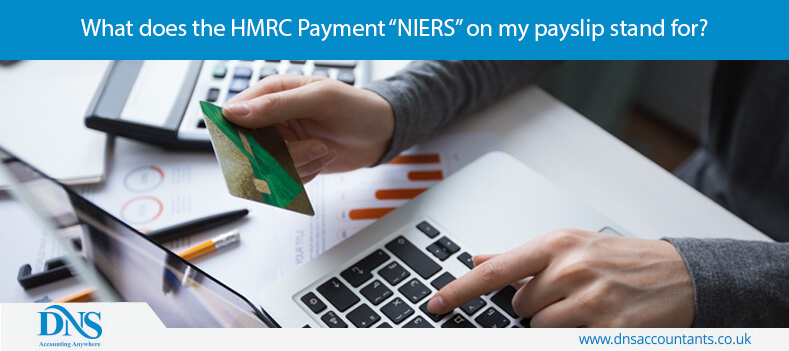
Employers National Insurance Contributions are paid by all businesses in the United Kingdom on top of the employee's gross pay. Employers National Insurance will be paid on your behalf if you are paid as a contractor through PAYE by an agency or an umbrella company.

However, one of the most frequently asked questions about contractor pay are - What this NIERS deduction on my payslip means? If you are paid through an umbrella or limited company payroll, many employees are unaware of this deduction on their payslips.
Siddharth Agarwal, Tax Director at DNS Accountants, explains what the NIERS code on your payslip means and why it has generated some controversy and criticism.
To put it simply, it is the Employers' National Insurance Contribution. Employers must pay employers national insurance contributions (NICs) on their employees' earnings in the United Kingdom. Usually, these are referred to as Class 1 Secondary contributions.
NIERS are computed at a rate of 13.8% (for 2021/22) and are usually payable on weekly earnings exceeding the amount of £170 (for 2021/22).
Thus, if you are paid directly by an agency or an umbrella firm through their payroll system, you may notice the NIERS deduction on your payslip as a contractor. This is because they are required to operate PAYE and pay NIC on your earnings as your employer.
Consider a contractor who works off-payroll and is paid through an agency (as an agency employee), at a PAYE rate of £600 per day.
If the contractor works Five days a week, their gross weekly earnings will be £3,000 (£600 x 5 days) will be liable to PAYE.
Employer’s national insurance is calculated by the agency on gross weekly earnings after making the secondary threshold deduction of £170 per week.
The NIERS will be worked out as follows:
Weekly earnings (Gross) = £3,000
Less – Secondary Threshold = (£170)
Pay Subject to NIERS = £2830
NIERS payable at a rate of 13.8 % = £2,830*13.8% = £390.54
Umbrella firms, as your employer, are obligated by law to pay PAYE and NIC on your earnings. As a result, both parties are responsible for the Employer's National Insurance Contributions, whether you work through an agency or an umbrella company.
No, it should not be the case. To accommodate for the additional overhead, the National Insurance Employers Contribution and other costs are factored into the contractor's agreed rate, generally referred to as the 'assignment rate,' so that the Umbrella Company can make the appropriate contribution on behalf of the contractor.
When agencies and umbrella providers agree on a rate, they often include this deduction in their calculations, as they must ensure that the NIERS contribution is retained to pay HMRC.
If you've switched to an umbrella provider, your rate may appear to have increased. This is typically because the agency/end client passes the same to umbrella to pay NIERS and other employment costs on your behalf.
If you are paid through an umbrella, the umbrella will now be responsible for NIERS due to their classification as your employer. The NIERS is included in your contractor's PAYE rate to pay this cost. The difference between this PAYE rate and the rate you get is for NIERS and other employment overheads that Umbrella is legally required to pay.
As a result, it is essential that you know the distinction between the PAYE rate (the actual income you receive) and the assignment rate agreed upon by the agency and your Umbrella.
There has been significant media coverage and controversy around contractors, agencies, and umbrella providers. According to media articles and social media posts, contractors offering services through an umbrella company have employer national insurance contributions and other costs unfairly deducted from their salary.
This is not always the case. Whosoever pays the individual via PAYE will always take into account all employment costs (such as employers NIC, holiday pay, and apprenticeship levy) when calculating the gross salary. This is how operators and agencies operate, and there is nothing illegal or unethical about it; they are simply following the law.
While there may be rogue players in the sector, the majority of agencies and umbrella providers do not engage in illegal activity. By dealing with reputable agencies and umbrella providers, you can safeguard yourself against any illegal activities. As a contractor, you should demand a Key Information Document (KID) from your agency to provide complete transparency on your compensation.
Many contractors still do not understand what NIERS is, and they are concerned that it is being taken wrongly from their pay, or that it is illegal as a result of media coverage. Because agencies and umbrella providers are required to pay NIERS to HMRC, it is a lawful deduction.
If you have any questions or would like specialist advice on “NIERS”, please contact DNS Accountants on 03330886686 or by e-mail at enquiry@dnsaccountants.co.uk.
Speak with an expertAny questions? Schedule a call with one of our experts.
About the author Siddharth Agarwal
I am a Chartered Tax Advisor (OMB) and ACCA. I have 9+ years of experience in owner-managed business taxation issues, company reorganisations, property taxation, and succession planning. I also work with private clients on bespoke tax planning strategies for trusts, residence status, and non-residents. I aim to fulfil my professional duties towards my clients and keep them satisfied, my utmost priority. I believe in establishing and maintaining businesses and personal relationships as the key to mutual growth.